A novel heat-activated current in nociceptive neurons and its sensitization by bradykinin
- PMID: 8986829
- PMCID: PMC26422
- DOI: 10.1073/pnas.93.26.15435
A novel heat-activated current in nociceptive neurons and its sensitization by bradykinin
Abstract
Pain differs from other sensations in many respects. Primary pain-sensitive neurons respond to a wide variety of noxious stimuli, in contrast to the relatively specific responses characteristic of other sensory systems, and the response is often observed to sensitize on repeated presentation of a painful stimulus, while adaptation is typically observed in other sensory systems. In most cases the cellular mechanisms of transduction and sensitization in response to painful stimuli are not understood. We report here that application of pulses of noxious heat to a subpopulation of isolated primary sensory neurons rapidly activates an inward current. The ion channel activated by heat discriminates poorly among alkali cations. Calcium ions both carry current and partially suppress the current carried by other ions. The current is markedly increased by bradykinin, a potent algogenic nonapeptide that is known to be released in vivo by tissue damage. Phosphatase inhibitors prolong the sensitization caused by bradykinin, and a similar sensitization is caused by activators of protein kinase C. We conclude that bradykinin sensitizes the response to heat by activating protein kinase C.
Figures
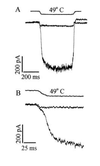
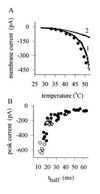
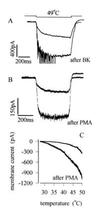

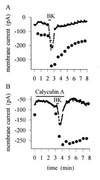
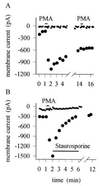
Comment in
-
More sensory competence for nociceptive neurons in culture.Proc Natl Acad Sci U S A. 1996 Dec 24;93(26):14995-7. doi: 10.1073/pnas.93.26.14995. Proc Natl Acad Sci U S A. 1996. PMID: 8986750 Free PMC article. Review. No abstract available.
References
Publication types
MeSH terms
Substances
LinkOut - more resources
Full Text Sources
Other Literature Sources
Medical

